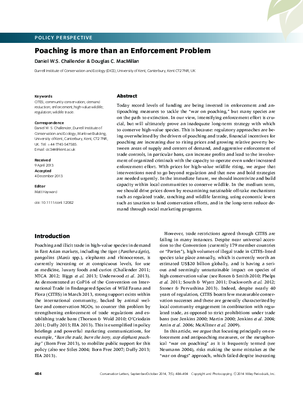Poaching Is More Than an Enforcement Problem

A policy paper that explores strategies to reduce poaching other than enforcement, including demand reduction, farmed wildlife, social marketing, and incentivizing and empowering local communities.
Key Points in Document:
- A policy paper that explores strategies to reduce poaching other than enforcement, including demand reduction, farmed wildlife, social marketing, and incentivizing and empowering local communities.
- The authors suggest that solely intensifying enforcement is ineffective in the long run, as reducing the complexities of the wildlife trade into a law enforcement problem fails to address the underlying drivers. For instance, regulation is easily overwhelmed by demand drivers, rising prices and growing relative poverty between areas of supply and centers of demand. Furthermore, aggressive enforcement of trade controls and bans can increase profits and lead to the involvement of organized criminals with the capacity to operate even under increased enforcement effort.
- Regarding demand reduction, the authors discuss price inelasticity of demand (unresponsiveness of consumer demand when faced with a price increase) of wildlife goods as a potential fundamental issue undercutting enforcement efforts.
- Increased community engagement and incentives to conserve wildlife is also discussed as a potential alternative solution to combatting poaching, including disposable income, secure land and resource tenure, and access to health and educational services. By acknowledging market conditions and the socioeconomic needs of communities at risk of poaching, the authors suggest we may better target the real drivers of illegal wildlife trade.
Citation: Challender DWS, MacMillan DC. Poaching is more than an Enforcement Problem. Conserv Lett. 2014;7(5):484-494. doi:10.1111/conl.12082.

